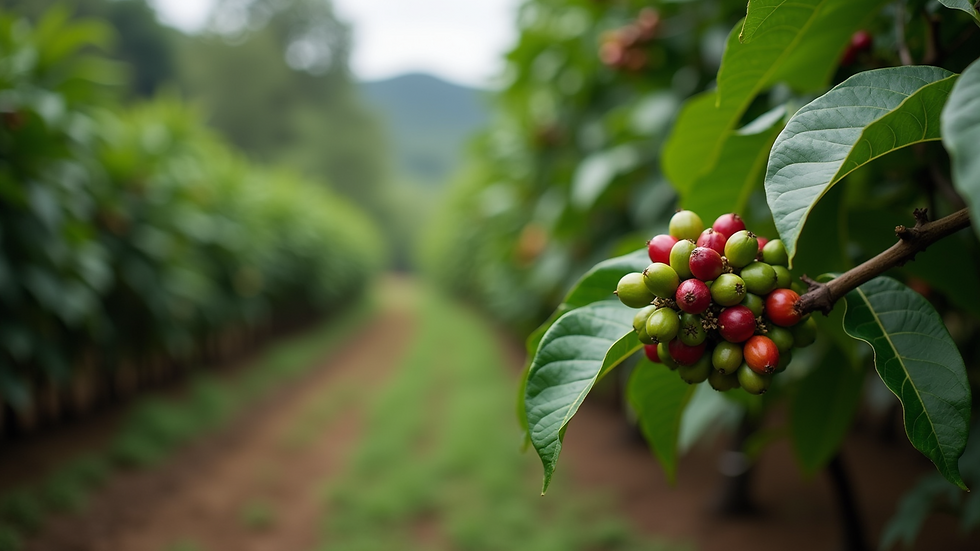Exploring the Benefits of Organic Coffee for Everyday Life
- Prashanth Nagaraj
- Jul 22
- 3 min read
Coffee is more than just a morning ritual; it’s a worldwide phenomenon. Among coffee options available, organic coffee stands out due to its unique health and environmental benefits. In this blog post, we will delve deep into the advantages of incorporating organic coffee into your daily routine.
What is Organic Coffee?
Before understanding its benefits, let’s clarify what organic coffee is. Organic coffee comes from beans that are grown without the use of synthetic fertilizers or pesticides. This farming method prioritizes environmental health, focusing on natural processes. As a result, organic crops promote biodiversity and sustainable farming practices.

The certification process for organic coffee ensures that farmers adhere to strict guidelines that protect the ecosystem. To get certified, farms must go through rigorous inspections. This often results in higher quality coffee, which can significantly enhance your coffee experience.
Health Benefits of Organic Coffee
One of the most compelling reasons to switch to organic coffee is its health benefits. Many studies suggest that organic coffee has higher antioxidant levels compared to conventional coffee. Antioxidants are essential as they help neutralize free radicals in the body, which can lead to diseases.
Additionally, organic coffee is less likely to contain mycotoxins, toxic compounds produced by mold. These mycotoxins can affect your health adversely. Through organic farming practices, the likelihood of mold growth is reduced, ensuring a safer drinking experience.

Furthermore, drinking organic coffee may reduce the risk of certain diseases. Research has linked coffee consumption to lower rates of type 2 diabetes and Parkinson's disease. The richer nutrient profile of organic coffee also means that you benefit from a smoother taste and aroma, elevating your daily coffee ritual beyond mere caffeine intake.
Environmental Impact of Organic Coffee
Coffee production can have significant environmental implications. Traditional coffee farming often relies on harmful chemicals that can lead to soil depletion and water contamination. Conversely, organic coffee farming practices focus on sustainability and environmental stewardship.
In organic farming, methods like crop rotation, composting, and natural fertilization contribute to healthier soil. This not only supports coffee growth but also protects local ecosystems. Choosing organic coffee supports small farmers and promotes fair trade practices, thereby contributing positively to the local economy.

Moreover, organic coffee farms are often located in shaded areas, which helps to preserve the habitat for various wildlife species. This blends agriculture with conservation, showcasing a holistic approach that benefits both the consumer and the planet.
Flavors and Quality of Organic Coffee
Another remarkable benefit of organic coffee is its exceptional flavor profile. The natural growing processes used in organic farming act as a catalyst for richer flavors. The absence of synthetic fertilizers allows the coffee beans to develop nuances that are often overshadowed in conventional coffee.
Organic coffee is generally grown in higher altitudes, where the cooler climate contributes to the beans’ quality. Many coffee connoisseurs appreciate the diverse flavors ranging from fruity or floral notes to chocolatey undertones, making each brew a unique experience.
When you choose to buy organic coffee from sources like woodi peck's, you’re likely to secure fresh, fairly traded products that promise quality and ethical production.
Making the Switch to Organic Coffee
If you’ve decided to embrace organic coffee, there are practical steps you can take to make the switch. Here are some recommendations:
Start Small: You don’t need to fully change your coffee consumption right away. Start by replacing one cup of your regular coffee with organic coffee.
Explore Flavors: Visit local coffee shops or roasteries to sample different organic coffee options. Many shops offer tasting flights to help you find the perfect variety.
Read Labels: When grocery shopping, look for organic certifications on the package. This ensures that the coffee you are buying is genuinely organic.
Invest in Quality: Sometimes, it’s worth investing a bit more for high-quality organic coffee. Your taste buds will appreciate it, and the health benefits will follow.
Stay Informed: Keep yourself updated on organic farming practices and the benefits of various coffee varieties. Being informed helps you make ethical choices.
Life Enhancement through Organic Coffee
Integrating organic coffee into your daily life isn't just about enjoying a delicious cup; it’s also about enhancing your overall well-being. By supporting organic practices, you contribute to a healthier planet while enjoying numerous health benefits.
Furthermore, savoring a high-quality cup of organic coffee can elevate daily rituals, making each sip a pleasurable experience. This can enhance the moment whether you’re enjoying a quiet morning alone or connecting with friends over a cup.
In summary, the advantages of organic coffee go beyond taste; they contribute positively to your health and the environment. The choice to consume organic coffee represents a commitment to quality, sustainability, and well-being.
Transitioning to organic coffee is undoubtedly a step toward promoting a healthier lifestyle, benefiting ourselves, farmers, and our planet at large.


Comments